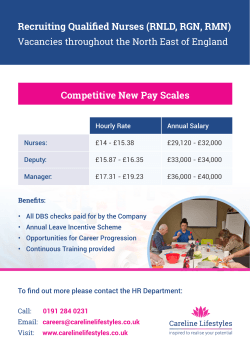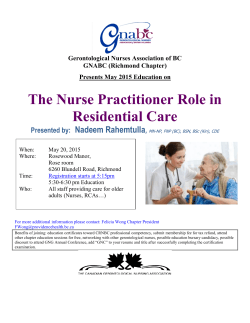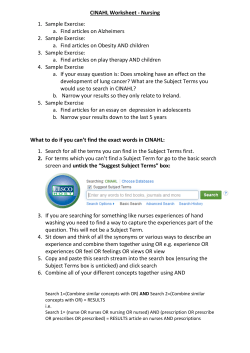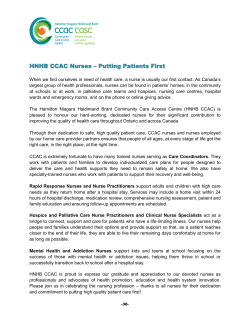
the March 2015 newsletter
Stewards Corner We Got Chairs Now Last month we reported that management on 2C was attempting to forbid nurses from sitting at any time while on duty – including when they were charting. Nurses on 2C took action – over 90% of them signed a petition and they demanded meetings with senior management. They organized themselves before meeting with management so that all of them spoke up and talked about the multiple problems: short staffing, high turnover, and the punitive environment. We are pleased to report that the chairs were returned, the policy on “no-sitting” was reversed, and the nursing director of the unit abruptly resigned. Nurses on 2C are feeling great and have learned the collective power of union action. Shop Steward Updates: Great news: We have a new Chief Shop Steward, Stephanie Sims NICU RN. She will be leading our Shop Steward committee. Stephanie has been at MWHC for 9 years and is on our bargaining team. Stephen Frum has left MWHC and will continue to advocate for RNs as a full-time labor representative with NNU. Stephen is currently assigned to represent MWHC nurses and will remain on our bargaining team. Shop Steward training. Do you want to learn how to build a strong RN movement? Come for a no-obligation Shop Steward orientation; a fun discussion of the law and activism. Silver Spring, Monday March 30, 9 am to 3 pm. RSVP to sfrum@nationalnursesunited.org Shop Stewards continue to hold grievance meetings with management and win: Last week we got a step 1 discipline for time and attendance overturned. If you have questions about discipline contact a Shop Steward. RATIO Bill Introduced in DC Council! On March 2 RNs from across the city joined with D.C. Council members and community leaders to announce the introduction of the 2015 Patient Protection Act. Modeled after a successful California law, the 2015 Patient Protection Act sets specific limits on the number of patients RNs can care for (nurse-to-patient ratios) in Washington, D.C.’s hospitals. "This legislation is very important to ensure quality of care for residents of the District of Columbia," Council Chairman Phil Mendelson said. Mendelson, who is co-sponsoring the legislations, was joined at the press conference by three other Council members, NNU CoPresident Jean Ross RN, other nurse leaders, the Metro Washington Council AFL-CIO, community activists, and faith leaders. "Hospitals are shortchanging patients by shortchanging staffing. Registered nurses, who see the crisis every day are fighting for this bill because proD.C. Nurses Introduce Ratio Legislation tecting patients is an intrinsic part of their calling,” said Stephanie Simms RN, Chief Shop Steward and NICU nurse. The introduction of the bill is just the first step in 2015 to winning ratios for all hospitals in DC. RNs will have to take more action – including talking directly to other council members – in order to gain the patient protections needed in DC. You have a role to play. www.nationalnursesunited.org | facebook.com/nationalnurses | @nationalnurses MWHC Slapped With Federal Charges We know that MWHC executives have engaged in a ruthless campaign to foster an environment of coercion to keep us from winning improved patient safety conditions, our concerns have fortunately been validated by the Regional Director of the National Labor Relations Board. We filed dozens of charges against MWHC related to management’s conduct in our contract campaign and many of our charges have been upheld. First and foremost, the Board found that management’s implementation of its pension and healthcare offer were illegal and ordered management to negotiate over these important topics. Management has engaged in a multi-year campaign to erode our health and welfare package, essentially forcing us to use Medstar Health for our own health care or pay massive co-pays and deductibles if we choose a provider outside of MedStar. Nurses have won considerable refunds in the past due to illegal changes to our health care and management has sought to put an end to these, forcing us to use their “company store.” Armed MWHC security guard attempts to intimidate nurses who shared information about contract negotiations at MWHC. The Regional Director also found merit in most of the charges related to management’s campaign of surveillance and intimidation. Nurses documented dozens of instances where management personnel and armed security guards followed nurses throughout the hospital, even into the parking lot. On one occasion, armed security took pictures of a nurse’s car in an attempt to intimidate her. On another occasion, six managers and security guards surrounded a nurse who was discussing contract negotiations in a break area while nurses were on lunch. While the Regional Director didn’t uphold our charge related to management’s 10 day lockout, we have filed an appeal as we continue to believe that management did not have any valid business reason for locking nurses out for 10 days and hiring expensive replacement nurses. While the Regional Director may not have found MWHC in violation of the law on this subject, nurses and community members find MWHC’s behavior morally reprehensible. What’s Next Nurses are calling on MWHC executives to return to the bargaining table and negotiate a contract that address wages, benefits, and other outstanding issues. The NLRB may order that a trial be held to determine the outcome of the unfair labor practice charges. Why Nurses Oppose TPP/Fast Track 2. Nurse to patient ratios, other hospital workplace safety rules, and any regulations enacted in the U.S. that protect patients or consumers could potentially be challenged with the state facing lawsuits or threats of lawsuits from foreign corporations who charge they impose trade barriers or unfair completion. Nullify environmental health protections Nurses oppose Fast Track authority for the Trans-Pacific Partnership (TPP) because we believe this trade deal and the fast track process pose a serious threat to public health and democracy. The TPP is a NAFTA-style trade pact with 11 other Asia-Pacific nations. 1. Environmental regulations that limit toxins in water, air, and food that cause a broad range of serious illnesses, including pulmonary and cardiovascular disease, cancer, eye and skin damager, impairment of neurological function, reproductive and developmental problems, would all be subject to challenge by global corporations under the TPP. Limits patient access to life saving medications 1.The TPP allows giant pharmaceutical corporations lengthy extensions of monopoly control for patents for their high priced brand name drugs – and the ability to block competition from cheaper, generic drugs. 2. The TPP also grants big drug companies exclusive access to the market for 12 years for “biologic” drugs – medicines developed through biological processes – that are increasingly critical for patients fighting cancer, MS, Alzheimer’s disease and many other illnesses. These drugs are extremely costly; 11 of 12 cancer drugs approved by the FDA cost more than $100,000, yet the TPP would prevent competition from generic “biosimilar” drugs. 3. Limiting access to cheaper generic drugs can mean life and death for low and moderateincome patients, many of whom already face unpayable bills for meds and other healthcare. Nurses regularly see patients who don’t fill prescriptions, cut pills in half, or skip days of taking drugs due to the cost. 4. Patients in developing countries would be especially harmed. Many of those countries have fought for years for access to lower cost drugs to treat HIV/AIDS, hepatitis, and other infectious diseases. The TPP would set back many years of effort to increase access to more affordable medications. A threat to democracy and national sovereignty 1. The trade deals are being negotiated in secret, mostly written by corporate lobbyists, with information about the critical provisions only available to the public through leaks. Even members of Congress have strict limits on what they can view in the pacts. The public is entirely shut out. Nurses from across the U.S. tell members of Congress to say no on fast track February 26 in D.C. 2. Under Fast Track, Congress is only allowed to vote a trade agreement up or down, no amendments are allowed, even floor debate is limited. Corporations have total participation in writing the terms of the pacts, but our elected representatives and the public are largely excluded. 3. Trade deals now increasingly let global corporations override laws and regulations enacted by national governments, and even by state and local governments. 4. Most trade pacts include Investor State Dispute Settlement corporate tribunals, with corporate aligned arbitrators, that allow corporations to sue national or local governments to block or over turn laws they believe are “unfair” to that corporation. They also permit corporations to sue governments they say limit their profits or RNs Protesting Fast Track In California 5. The TPP would open the door for pharmaceutical giants to challenge, and overturn the ability of governments to negotiate lower drug prices through bulk purchasing agreements. This would affect U.S. programs including Medicare, Medicaid, and VA and military health programs. Exposes Americans to unsafe food 1. Global corporations under the TPP would be able to challenge and evade food safety laws and regulations. 2. U.S. food safety laws on use of pesticides and additives on meat, poultry, seafood, and vegetables that are stricter than rules in other nations would be threatened as “illegal trade barriers” that could subject American consumers to unsafe food. 3. One example, seafood products from Malaysia and Vietnam, both TPP negotiating partners, have seen high levels of contaminants in their seafood. Threatens public health campaigns and services 1. The TPP allow corporations to sue national or local governments over public health provisions they say restrict their trade or labeling rights, and profits, and encourage privatization of many public services. May 28th: Continuing Education Course 9:00am-4:00pm Double Tree Hotel, 8727 Colesville Road, Silver Spring, MD 20910 Class Subject » Time to Care: RN Patient Advocacy in the Age of Healthcare Restructuring Health information technology has long been used by healthcare corporations to undermine the skill and professional judgment of registered nurses in an effort to shift the responsibility of direct patient care onto non-nurses or even automated systems. This class will connect the dots between the redefinition of patient care and the larger restructuring of the healthcare industry by focusing on the common role of HIT in both of these transformations. Attendees must remain for the full session to receive CE credit (6 CEHs). Sign up today or contact Dantisha Berry at dberry@nationalnursesunited.org or 240-235-2000 to reserve a space in this important class.
© Copyright 2025









